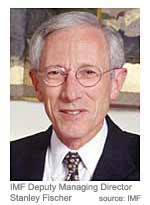|
IMF defends globalization
|
 |
September 22, 2000: 10:02 a.m. ET
Fischer says no pain, no gain; more dialogue with critics, says Wolfensohn
By Staff Writer M. Corey Goldman
|
PRAGUE, Czech Republic (CNNfn) - Globalization is the best way to ensure that the world becomes a more prosperous place, but it has to be implemented with safeguards to ensure it doesn't hurt people, International Monetary Fund Deputy Managing Director Stanley Fischer said Friday.
 Speaking at the launch of the program of seminars that occur in conjunction with the IMF-World Bank annual meetings, Fischer spoke about the challenges and opportunities that come with globalization - inequalities of income, differences in living standards and unequal flows of investment capital that tend to bypass less-developed nations. Speaking at the launch of the program of seminars that occur in conjunction with the IMF-World Bank annual meetings, Fischer spoke about the challenges and opportunities that come with globalization - inequalities of income, differences in living standards and unequal flows of investment capital that tend to bypass less-developed nations.
At the same time, he defended the IMF's push to continue working with member countries on ways to boost economic output and make living standards among all countries better - pointing out that the best roles for the IMF and World Bank are to ensure that economic development in the world's worse-off countries is done in a way that doesn't create more strife.
"Some see it as a threat, some see it as an opportunity and some see it as inevitable," Fischer said. "They are all right. "Globalization is good, and pointing the world economy in the right direction to foster that kind of growth is the right thing to do."
Golden globalization?
According to Fischer, the benefits of globalization are clear, particularly on the evidence of the past half century. Since the Second World War, the world economy has expanded at a faster pace than during any other period in history, helped along by massive strides in communication technology, protection and promotion of human rights, equality and prosperity.
 But it has also led to some startlingly wide inequalities: environmental damage, disparities of education, poor working conditions, significant differences in wages, "factors that are part of the reason for the expected protests outside," Fischer said. "We must work to right these inequalities." But it has also led to some startlingly wide inequalities: environmental damage, disparities of education, poor working conditions, significant differences in wages, "factors that are part of the reason for the expected protests outside," Fischer said. "We must work to right these inequalities."
To some degree, Fischer's remarks reflect the current state of the Czech economy, which is celebrating its 10th year as a market-based economy in the wake of the bloodless Velvet Revolution that overthrew the country's communist government in 1989. Since then, massive inflows of capital have come into the country to develop long-neglected industries on the one hand, but they've been accompanied by startling wage disparities, shoddy infrastructure and shortcomings in education.
Thousands of protesters are expected to descend on the Czech Republic and Prague in the coming days to have their say against exactly that; they are arguing that the promotion of human rights and preservation of the environment are two issues most affected by globalization.
In a separate gathering Friday with non-governmental organizations (NGO's) registered for this year's meetings, World Bank President James Wolfensohn said the bank was willing to talk to critics about how to address some of the problems of globalization, but acknowledged that many at the bank simply did not trust NGOs to cooperate.
World Bank: We're not evil
"There is a need for cultural change in the bank to trust NGOs and to talk to them, but there is an equal need for some members of civil society to give us a chance and not say simply that it's the bank and it must be evil," Wolfensohn told reporters. With him were some of the 350 representatives
of the various NGO's gathered in Prague, which span everything from Jubilee 2000 to Oxfam.
 "We are asking for calm, and the opportunity to build a bridge," said Wolfensohn. "But it's very difficult to build a bridge if only one side is building it." "We are asking for calm, and the opportunity to build a bridge," said Wolfensohn. "But it's very difficult to build a bridge if only one side is building it."
For Oxfam campaign manager Frances Fernandes, that bridge can only be built if the two sides actually end up meeting somewhere - having some kind of influence on trade restrictions, and pursuing more policies that spur governments of less developed countries to secure human rights for their people, for instance.
"Rich countries use their dominance of the IMF, where they control more than half the voting rights despite representing just 14 percent of the world's population, to remove trade restrictions in poor countries," she said. "Unless they come up with more concrete ways of dealing with these issues, there isn't going to be a bridge, at least not with the bank or the IMF." 
|
|
|
|
|
 |

|

